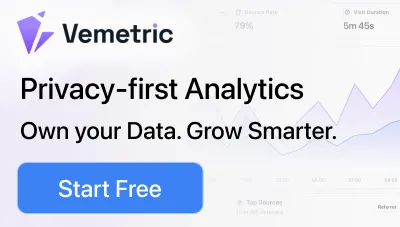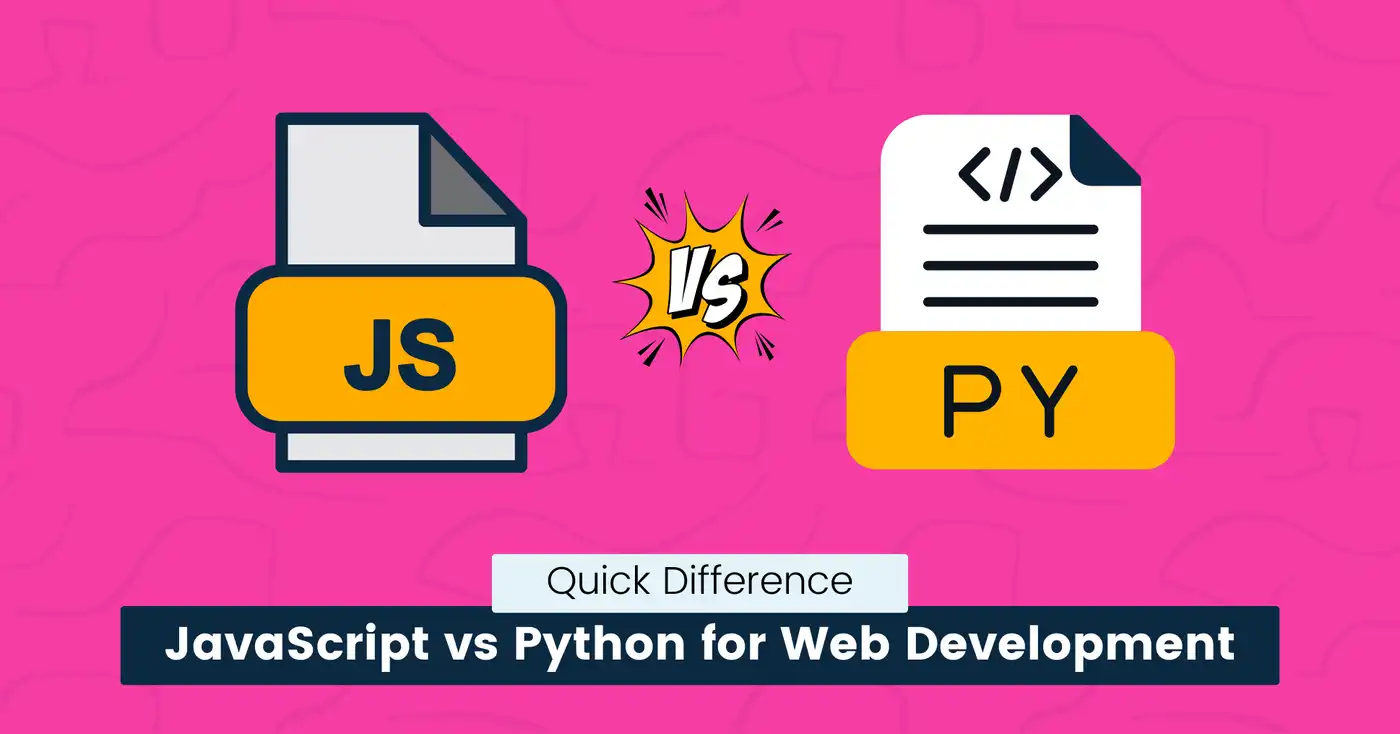
JavaScript vs Python for Web Development (2024)
Software development is a dynamic field that is constantly evolving with new technologies.
To keep up with technological advancements, it is important to learn a technology that is popular, in high demand, and has a wide range of use cases.
That’s why choosing the right programming language for web development is crucial for your project’s success.
JavaScript and Python are two of the most popular languages, each with its own unique features.
So, what sets them apart, and how can you choose the right one for your project?
This guide will break down the key differences, features and use cases of JavaScript and Python to help you decide which is best for modern web development.
Let’s get started.
snappify will help you to create
stunning presentations and videos.
Why Choose JavaScript for Web Development?
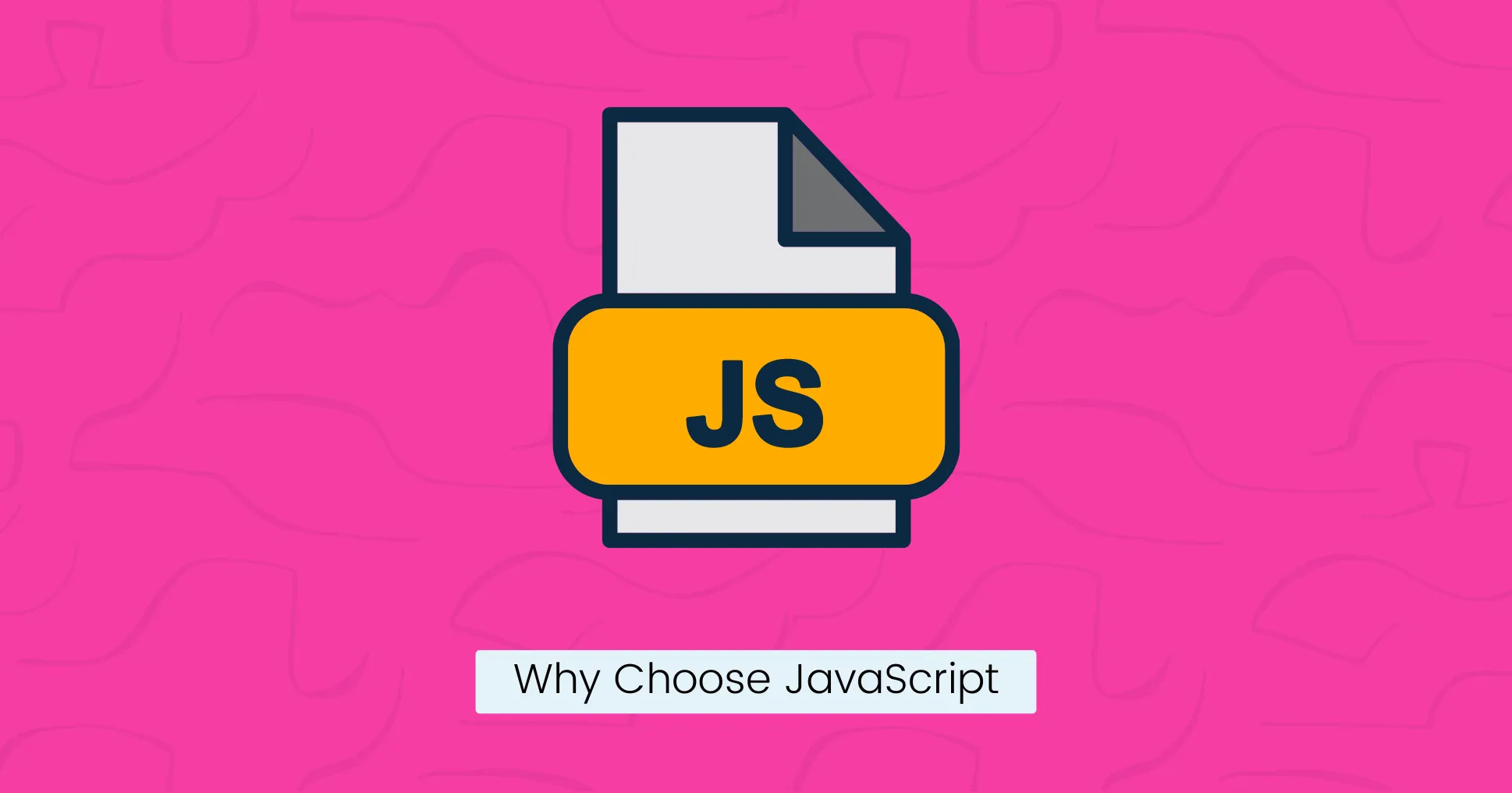
JavaScript is a high-level programming language that is used to make websites interactive.
It is a scripting language that runs directly in your web browser and is widely used for front-end development (the part of a website you see and interact with).
While it is the go-to language for creating the client-side of web pages and applications, developers also use it for server-side development.
Key features of JavaScript
According to the latest Stack Overflow developer survey, JavaScript remains the most popular programming language, preferred by 62.3% of developers worldwide.
Here are the key features that make it a favorite in the developer community:
- Interactive Websites: It allows the creation of dynamic and interactive user interfaces. If you click a button, see a transition or a drop-down menu, or watch a live update without reloading the page, JavaScript is working behind the scenes.
- Cross-Platform Compatibility: JavaScript code works in all modern web browsers and operating systems, so you can provide a consistent user experience for all users.
- Rich Ecosystem: JavaScript has a rich ecosystem of libraries and frameworks (React, Angular, and Vue.js) that simplify complex tasks and speed up the development process.
- Asynchronous Programming: You can perform tasks in the background without blocking the overall program flow.
- Versatility: It is a powerful language that can be used for both front-end and backend development, making it suitable for full-stack web development.
Use Cases of JavaScript
Some examples of JavaScript use cases include:
- Mobile App Development: JavaScript framework React Native allows developers to build cross-platform mobile apps for both iOS and Android.
- Single-Page Applications (SPAs): Frameworks like ReactJS and Angular make it easier to create single-page apps where all interactions happen on one page without reloading.
- Automation: It automates repetitive tasks and makes web development more efficient. For example, you can write scripts for automated testing.
Big Names using JavaScript:
- Netflix
- Microsoft
- PayPal
- Uber
Why Choose Python for Web Development?
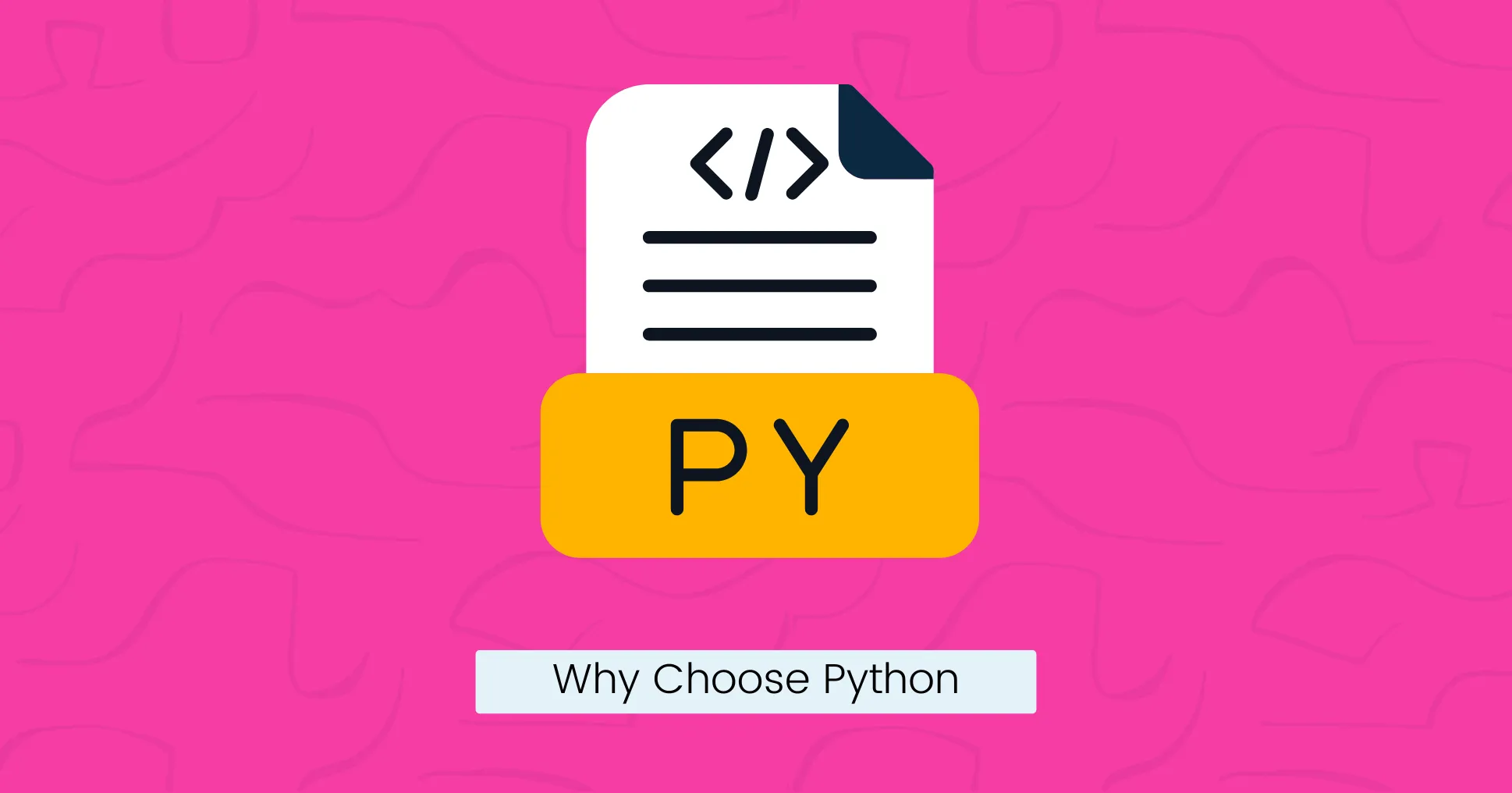
Python is a general-purpose programming language known for its versatility and easy-to-learn syntax.
It is based on the DRY (Don’t Repeat Yourself) principle of software development, which promotes clean, reusable, and maintainable code.
Even if you are new to coding, you can easily understand Python code because it is written like simple English.
That’s why Python is the most popular language for learning programming, with 66.4% of developers using it.
It is a powerful language that has gained popularity in recent years due to its diverse applications across many different areas.
Key features of Python
Python developers enjoy the following features:
- User-friendly: Python code is easier to read, write, debug, and maintain than other languages.
- Python Ecosystem: It is a high-level language that comes with powerful libraries and web development frameworks like Django and Flask that make building websites faster and easier.
- Integration: Python can easily connect to databases, handle large amounts of data, and integrate with other languages and tools.
- Versatility: While it is great for web development, Python can also be applied in many other areas, such as data science, artificial intelligence, machine learning, computer vision, natural language processing, and more.
- Object-Oriented Programming: Python is an object-oriented language that uses classes and objects to create modular and reusable code. This increases code readability and makes it easy to organize large codebases.
Use Cases of Python
Python has many applications that make it a great choice for different web development projects.
- Backend Development: Python is widely used to build a web application’s backend and make everything work on the server side.
- Quick Prototyping: Its simple syntax and powerful frameworks make it ideal for quickly prototyping and testing new ideas.
- AI and Machine Learning: Python is used to build AI applications and websites that use AI features, like recommendation systems or automated chatbots.
- Data Analysis: Data scientists use Python libraries like NumPy and Pandas to perform tasks such as data manipulation, analysis, cleaning, and visualization.
Big Names using Python:
- Spotify
- YouTube
- NASA
- Quora
Difference Between JavaScript and Python
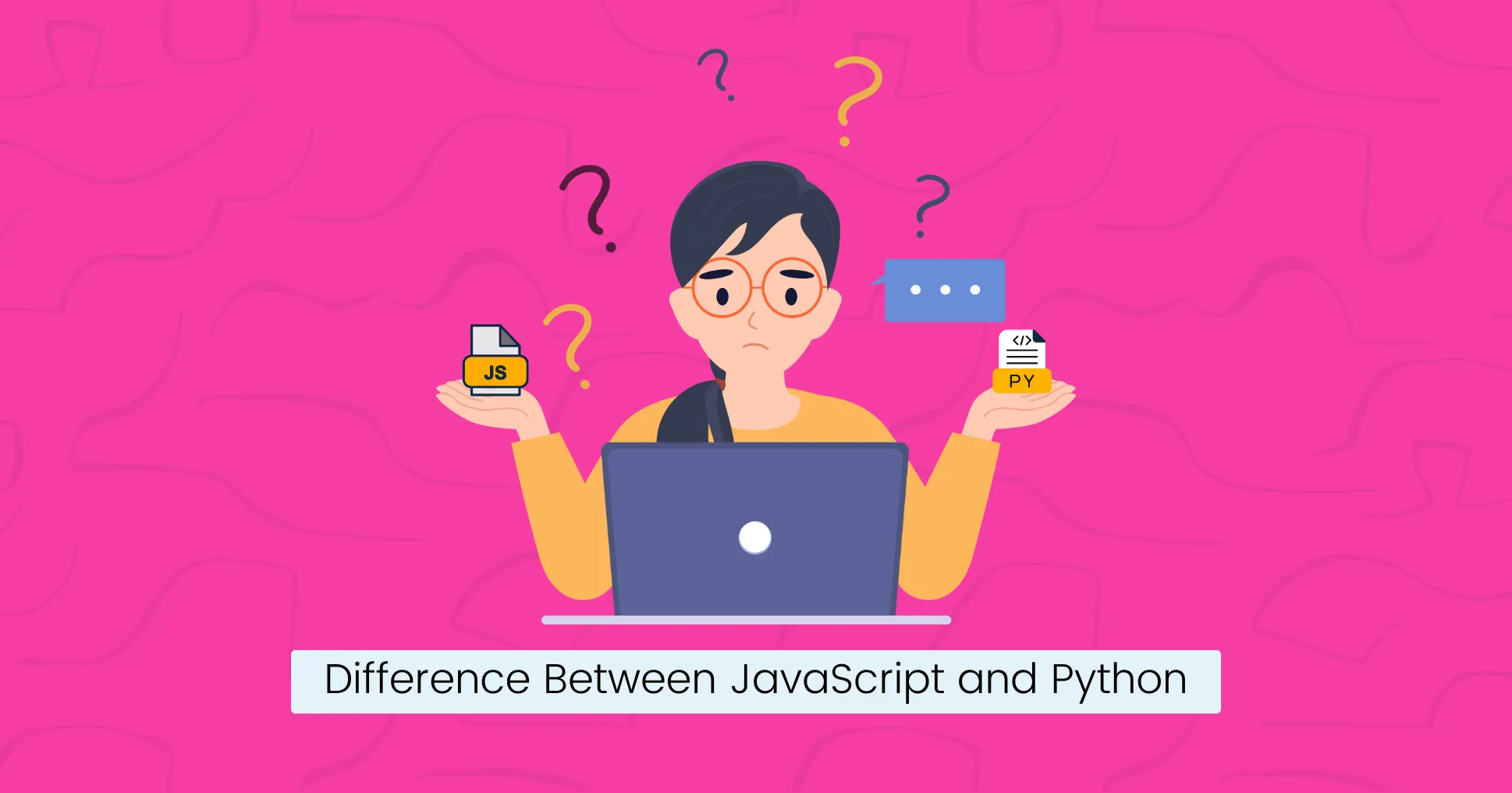
Now that you know the key features and use cases of both languages, let’s compare them to see their main differences.
Front-end vs. Backend
JavaScript runs directly in the browser and is mainly used to make websites interactive and responsive to user actions. It works both on the front end and the back end using Node.js.
Python runs on the server and is mainly used on the backend. It handles the server’s logic, such as processing data and managing databases.
Performance and Scalability
When it comes to speed and performance, JavaScript is best for quick front-end interactions.
It can handle real-time data and dynamic tasks that need to be performed instantly to improve user engagement and experience.
Python, on the other hand, is relatively slower than JavaScript, but it is an excellent choice for tasks that require intensive CPU usage, such as processing large amounts of data and large-scale applications.
Learning Curve
Because of its complexity, JavaScript can be tricky and time-consuming to learn for beginners.
It is also difficult to debug JavaScript code due to its syntax, asynchronous programming, and complicated variables.
Python is known for being beginner-friendly. Its clean and straightforward structure makes it much easier to grasp.
Web and Mobile Development
If your goal is to build fast websites that perform better and can handle a lot of data and users, JavaScript is the better choice.
It can perform multiple tasks at once without slowing down the app.
Also, its multithreading features allow developers to build highly scalable web applications that can grow with the project requirements.
JavaScript is better for mobile app development, as it utilizes tools like React Native and Ionic to create cross-platform apps.
On the other hand, Python is a better option if you are working on the server side, as it offers a stable environment that makes the development process faster and more efficient.
While Python can create graphical user interface (GUI) apps, it is not commonly used for mobile app development.
Use JavaScript if:
- You need to build interactive web pages or apps.
- You want to provide a consistent user experience across different devices and browsers.
- You want to use one language for both the client and server sides.
Use Python if:
- You need to integrate AI into your website.
- You need to build APIs that interacts with databases and other services.
- You need to develop and deploy a web application quickly.
snappify will help you to create
stunning presentations and videos.
Final Words
In conclusion, Python and JavaScript are powerful languages with strong community support, extensive resources, and frameworks.
Choose the one that best fits your goals and the requirements of your project.
If you like this article, you will also enjoy reading:
FAQs:
Is Python or JavaScript better for getting a job?
The choice depends on the industry and job focus. Generally, JavaScript is better for getting a job in web development, but Python is preferred for fields like data science, AI, and backend development.
Which pays more, JavaScript or Python?
While JavaScript offers more job opportunities, Python offers higher average salaries. According to Indeed, the average salary of a JavaScript developer is $113,918 per year, while Python developers earn $131,662 annually.
